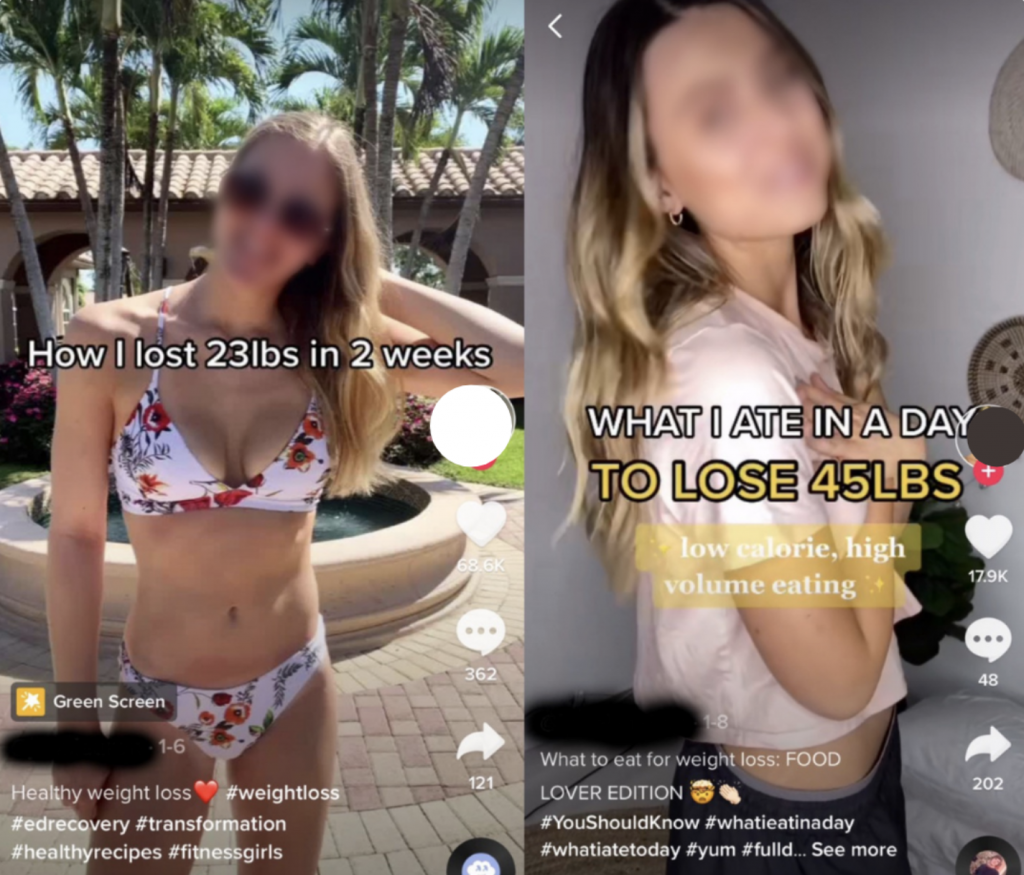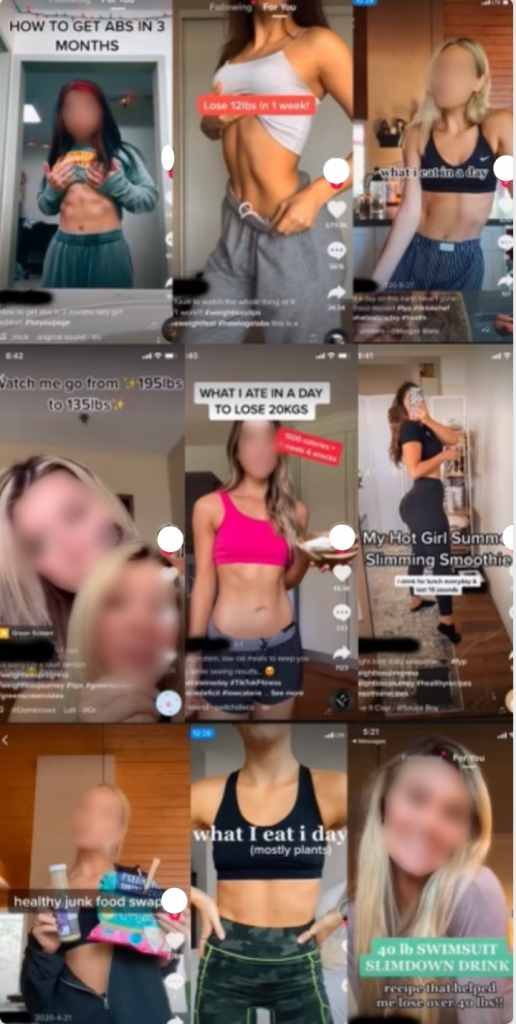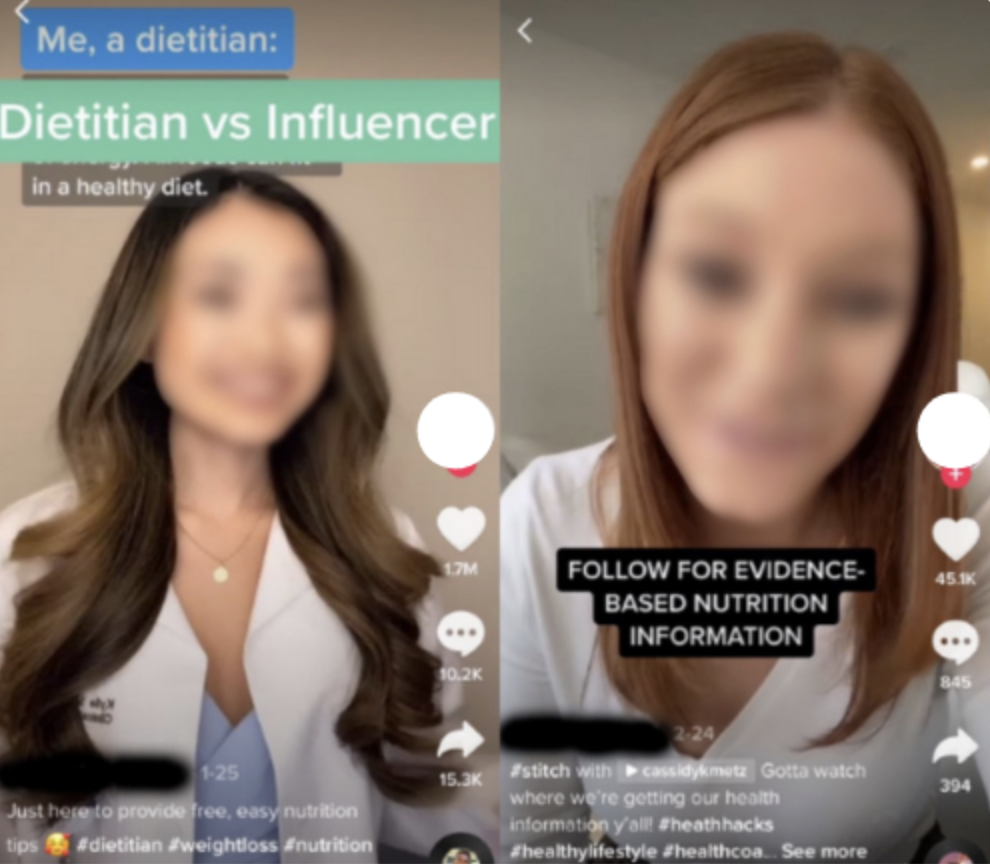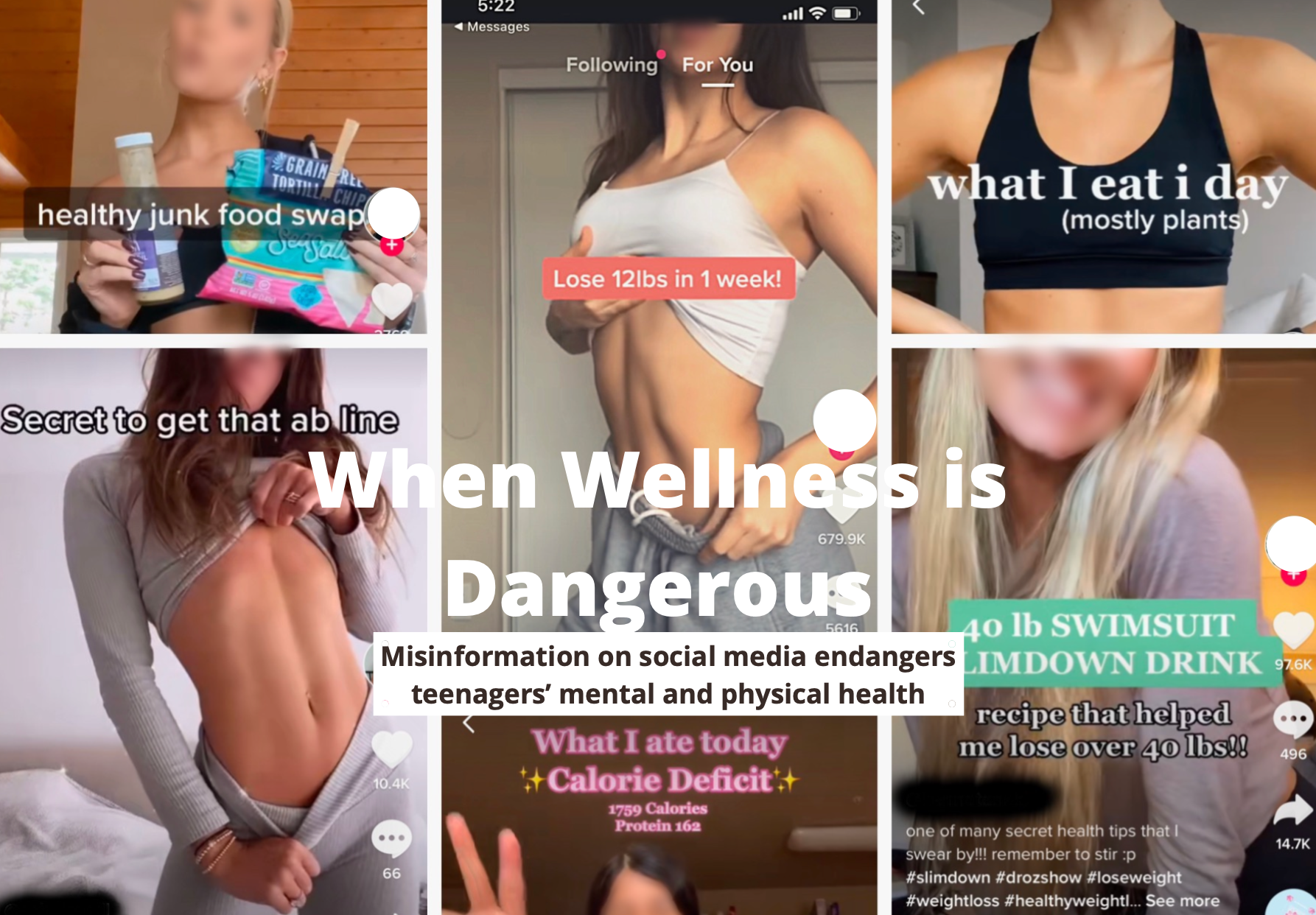By Becca Rawiszer
TikTok and Instagram, once known for sunset photos and viral dances, have quickly become notorious as the starting point for some dangerous health trends. Medical and health professionals say, thanks to the rise of influencer culture, these applications are now home to pseudo-wellness tips, dangerous diet plans, and hazardous physical challenges promoted by uncertified wellness personas who share false health, nutrition, and fitness tips that followers seem to just eat up.
“As someone who’s trying to work on having a positive body image, it’s so frustrating that it is almost impossible to avoid fake diet advice on the app,” said Katie Stone, a USC student and avid TikToker. Stone says she can see how a lifetime of eating disorder (ED) behaviors can develop from constant exposure to these videos. Some experts agree.
“People are getting sucked in and unfortunately developing eating disorders or disordered eating or an unhealthy relationship with movement,” said Amy Ruffolo Quinn, a licensed therapist specializing in treating eating disorders, anxiety, and depression.
“People are getting sucked in and unfortunately developing eating disorders or disordered eating or an unhealthy relationship with movement.”
-Amy Ruffolo Quinn, licensed therapist

Quinn believes online misinformation is definitely having detrimental effects on social media users’ mental and physical health. And to make matters worse, she says, it is spreading like wildfire.
“I am seeing in the eating disorder field, and especially with my adolescents, how influenced they are,” Quin said. “It creates these obsessional thoughts around what one needs to be eating in order to look a certain way, and in order to feel a sense of belonging or acceptance.”

According to a study by Glasgow University, some social media influencers give false diet and fitness advice 8 times out of 9. Between May and June of 2018, the health researchers analyzed the country’s most popular influencers, those who had over 80,000 followers, and scored their credibility based on 12 critical criteria. Out of the entire study group, only one influencer who was a registered nutritionist with a college degree passed with a score of 75 percent.
“We found that the majority of the blogs could not be considered credible sources of weight management information, as they often presented opinion as fact and failed to meet UK nutritional criteria,” lead author Christina Sabbagh said.
The videos posted by TikToker Ash Kandl would appear to place her in that group as well. Many of her videos consist of her saying “this drink will help you lose 10 pounds in a week,” “what I eat in a day to stay lean,” and “this is the secret to getting abs.” She advises people to follow her advice without any certification or degree on the subject. Reached by direct message, Kandl declined to comment for this story.
“These types of influencers really kind of exaggerate on why this works or how this works for them personally,” Quinn said. “And I think that can really pull a lot of myths to how people should be living and what they should be eating.” Quinn says that what works for one person often doesn’t work for everyone.
Nutritionist Rhiannon Lambert, who specializes in weight management and treating eating disorders, agreed and said, “There are a great many people who have absolutely no business talking to others about how to get healthy.” Lambert says that influencing people about decisions they are making about their health and bodies is as serious as it gets.
“I’ll go as far as to say it’s dangerous,” said Lambert.

Experts say that, due to the algorithms used by social media platforms, these so-called health tips and “skinny hacks” also often land in the hands of users struggling with eating disorders and other mental illnesses.
“This is because TikTok is essentially designed to show you what it thinks you want to see,” said Ysabel Gerrard, a lecturer in digital media and society at the University of Sheffield.
TikTok’s For You page is a feed of videos recommended by an algorithm based on the user’s history. The downside is that TikTok takes any key words from the user’s search or internet habits without a filter for harmful content. This means that if someone curiously watches a video promoting these dangerous habits, they are then supplied with more diet and weight-loss tips.
TikTok did not respond to requests for comments on this story, but on September 23, the company released a statement outlining their new policies. The company said these new guidelines were designed to ensure TikTok becomes a positive, inclusive, and safe experience for its users.
“We’re introducing new ad policies that ban ads for fasting apps and weight loss supplements, and increase restrictions on ads that promote a harmful or negative body image,” TikTok said in their statement.
While TikTok has begun taking action and investigating the issue, it has only banned 6 harmful accounts and deleted a few hashtags, according to a recent report in The Guardian. Despite TikTok’s efforts it takes only 30 seconds for a user to find a video promoting false diet or health advice, said The University of Sheffield’s Gerrard.
According to the Royal Society for Public Health’s #Statusofmind 2017 report, Instagram was ranked as the social media platform with the most detrimental effect on young people’s mental health. The survey analyzed 1,500 young people and asked them to score each of the social media platforms’ impact upon health and wellbeing-related issues.

“It’s interesting to see Instagram and Snapchat ranking as the worst for mental health and wellbeing,” Shriley Cramer, Chief Executive of the Royal Society for Public Health said. “Both platforms are very image-focused and it appears they may be driving feelings of inadequacy and anxiety in young people.”
While TikTok was not included in the study, due to the platform’s recent dangerous track record, Dr. Hina Talib of the Children’s Hospital at Albert Einstein College of Medicine in New York believes it is likely that TikTok would be found just as harmful.
“TikTok is the perfect storm to splash around these unsafe practices dressed up as popular thrills and set to catchy music,” said Talib, an adolescent medicine specialist.
Especially worrisome is the platform’s user base of 800 million, with 13 to 17 year-olds accounting for the majority, according to Statistica. These easily influenced age groups are scrolling through “what I eat in a day” videos, “skinny swap” posts, and are even learning about fasting trends. Unfortunately, as one engages with these types of posts, they only appear more often thanks to the algorithms used.

“It seems like every time I flag one triggering video down, they start to come back a couple hours later,” USC student Stone said.
“One of the downsides of TikTok is that I don’t get to filter the content I’m seeing,” said Kendall Brodbeck, another USC student and an avid TikToker. “It gets really frustrating when I get videos that show ‘what I eat in a day to lose 15 pounds’ and videos of people counting calories because it gets people in the mindset that they need to be doing the same,” added Brodbeck.
Brodbeck said, on a daily basis, she receives unwanted and toxic advice from influencers that she believes negatively impacts her. She believes she is educated enough to not follow this advice, but knows other users could be more easily swayed. Experts agree with her.
“The assumption is that if people are critical consumers of news and social media, then they will be able to reject misinformation,” said Ira Hyman, a psychologist specializing in human memory. However, Hyman points out that most people, including himself, don’t use critical thinking when scrolling through social media.
The very nature of how social media creates and builds celebrities can also make it hard for users to distinguish between good and bad advice.
“A celebrity recently came out with an intuitive fasting book,” said Pam Fullenweider, a certified dietitian and founder of Fully Mediteranean, a nutrition and wellness brand. “I know that people are going to do it because she is so popular, and she is a celebrity, people like her lifestyle, and she has cookbooks.” Fullenweider added that there is no scientific basis for the claims in the cookbook and since everyone’s body is different, diet trends such as intuitive fasting are not healthy for everyone
“If someone has a plethora of followers and likes and a nice image, then they can seem more legit than someone who just has a degree,” said Dr. Wesley McWhorter, national spokesperson for the Academy of Nutrition and Dietetics. McWhorter said this sense of legitimacy causes many users to follow and embrace false advice.
“While this issue of health misinformation has always been around, it exploded during the pandemic,” Fullenweider said. With more time at home and more time spent on social media, Fullenweider said people will look anywhere for what she calls a “quick fix.”
Fullenweider also emphasizes the importance of understanding the difference between a registered dietitian and a nutritionist.
“Anyone can call themselves a nutritionist, but to be a registered dietitian, you’re registered with the Academy of Nutrition, you have a licence to practice, and a masters degree.” Fullenweider advises checking people’s credentials before taking their advice.
“We, as dietitians, have been trying to push back and we are seeing more awareness on the issue,” Fullenweider said.
“I think the solution for us is to continue being present on different platforms to say hey, this is what nutrition is, this is how we’re doing it, and this is what we know is healthy,” said McWhorter of the Academy of Nutrition. He also believes, however, that some dietitian’s methods of calling people out are ineffective.
“I think the solution for us is to continue being present on different platforms to say hey, this is what nutrition is, this is how we’re doing it, and this is what we know is healthy,”
-Dr. Wesley McWhorter of the Academy of Nutrition
“The thing we don’t want to do is point the finger and say you don’t belong, don’t do this, you can’t do that because there is room at the table for all kinds of practitioners,” McWhorter said. He said that he believes taking a more positive approach is more effective.
“Having that voice out there and staying consistent on it is going to be the best way to combat it,” McWhorter added.
Some social media influencers also believe the wellness industry can have an extremely positive impact on users’ health.
Instagram wellness influencer and certified nutritionist, Sarah Vanloh, explained her certification taught her all about nutrition, fitness, and lifestyle, but she knows it is only acceptable for doctors and registered dietitians to diagnose or make meal plans for people. She said all she can do is help people implement healthier habits into their lives.
“I think everyone can be a part of the health and wellness group, but we all have different roles,” Vanloh said. “And knowing the limits to those roles is what helps to make sure people are getting the best possible care and no harm is done.”

